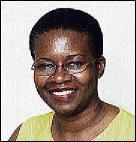
If they cared to, almost everyone in Burnside district could trace their ancestors back to the time when, after 'full free', the first families scrubbed the sugar plantation dirt from their feet, bundled up their few possessions and climbed the steep hillsides to stake a claim on lands the planter class had ignored.
More than 100 years on, freedom remains in their attitude and their language. 'Mi mouth free to chat.' is the precursor to colourful and protracted name calling, accusations and outright wars that start with women at the parish tank and fan out to involve entire families. 'Mi free. Me can do as me like,' says the emergent woman, tugging at the leash that binds her to her parents' house. 'Oonu too free!' the Pentecostal Church sister mutters scornfully as men tumble, fists flying, bottles breaking, from Lim Shim's betting shop and bar.
It is this sense of freedom that got into Horace Watson's head one early afternoon when, looking back, he observed Sybil Dutt, registered nurse, some 40 paces behind him when she should be matching him stride for stride.
All children were born at home under the supervision of old Mother Pinnock. On the day in question, however, the midwife was down with the flu. Due to a long-standing water tank war in which Horace's wife had come out the loser, the midwife's apprentice was entirely unsuitable; and so, with his wife's moans bouncing off his brain, the father-to-be ran the mile and a half to summon Ms. Dutt who, mercifully, was at home.
Ms. Dutt, of the crisp white uniform, no-nonsense shoes and cap, did not ordinarily do local deliveries. She made this clear, not so much in words as in the stiffening of her neck and the slow and deliberate unpacking, checking and repacking of her bag while the hapless summoner hopped from foot to foot at the back door. Only when she was satisfied that all was well, that her cap was perched just right and her badges were in place, did she lock and chain the door to her outside kitchen, shoot the bolt to the back door, close the jalousies, turn the key to the front door, and descend the front steps to hand the bag to the father-to-be. All this, in a district where turning the door and shouting to one's neigbour to 'give an eye' was usually sufficient preparation for departure.
Whatever impatience they might feel at this ritual, people treated Ms. Dutt with deference. The only legitimate daughter of a profligate Scotsman and his sickly wife, she had watched her equally profligate brothers populate the surrounding hills with brown children and squander the family estate. Without looks to invite the attention of a worthy suitor, and without the money to buy one, she had redeemed herself by 'taking book learning'. She was a nurse, communicant in good standing and organist at the Anglican Church (congregation: 19), and winner for many years of the parish elocution contest. They respected her fortitude; they respected her air of refinement, and her education.
Imagine the shock, therefore, when, looking back and seeing to his frustration Ms. Dutt exchanging greetings with the Post Mistress, Horace shouted: 'God in heaven, what happen to this stupid white bitch!'
The words clapped like thunder across the square. In the grocery shop, Moonshine Moore's hand froze midway to the scales and his jaw dropped. Horse racing fans across the street temporarily lost sight of the furlong post and fell into amazed silence. The words must have shocked Horace himself, for even he stood for a moment, seeming to think that someone else had invaded his thoughts and uttered them aloud. Then, perhaps realising that the die was cast and he had no option but to continue, he gave Ms. Dutt what is still remembered as the biggest tracing ever in Burnside district. He reminded her of her family who had come to Burnside with nothing but the shirts on their backs, and who through theft and a wicked white-man government had gained more land than they could manage. He reminded her of drunkenness and bankruptcy and bastardy. And he would have continued, had Moonshine Moore not put a stop to it all.
Ms. Dutt blanched, swayed in the afternoon sun, and had to be placed on a stool on the piazza of Lim Shin's betting shop, a place she had never before set foot in. Even in their outrage, the feeling tugged at Burnsiders that maybe Ms. Dutt had got a little of what she deserved. And so, though she continued to enjoy respect, it was without the high deference of previous times.
And so it was, too, that, in the midst of a revolution of sorts, Vivienne was born, a squalling, bloody mess, into the trembling hands of her father and under the supervision of a neighbour hurriedly called from the fields. Twenty years on, Vivienne is a lively, full-bodied young woman with a ready laugh and, when provoked, a blazing tongue.
'She can't help it,' everyone says then. 'Remember how her father trace Ms. Dutt?'
- Karlene Morgan

